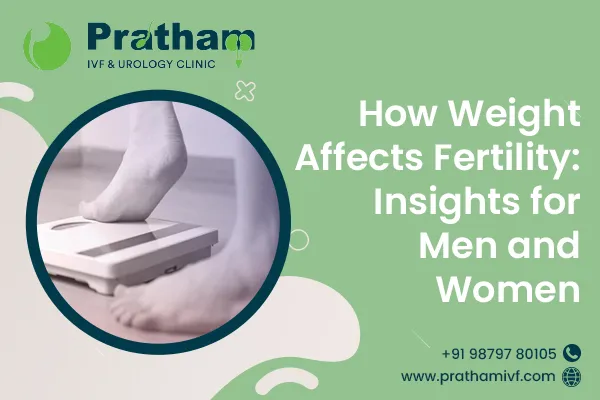
Fertility is influenced by many factors, and body weight plays a significant role in both men and women. Whether you're trying to conceive naturally or through assisted reproductive techniques, maintaining a healthy weight can greatly improve your chances of success. Understanding how weight impacts your reproductive system is crucial for planning a healthy pregnancy and achieving long-term wellness. Here, we explore the effects of underweight, overweight, and obesity on fertility, how weight disrupts hormones and reproductive function, and practical tips to maintain a healthy body for better fertility outcomes.
How Weight Affects Fertility in Women
1. Impact of Weight on the Menstrual Cycle and Ovulation
Excess body fat can interfere with normal hormone production. Fat cells produce estrogen, and having too much or too little can lead to irregular menstrual cycles or even the absence of periods (amenorrhea). Underweight women can have a delay in ovulation owing to insufficient estrogen. Conversely, overweight and obese women may produce too much estrogen, which disrupts the natural ovulation cycle, making it harder to conceive.
2. Obesity and Hormonal Imbalance
Obesity is strongly linked to hormonal imbalances, especially those involving insulin and androgens. High insulin levels can stimulate excess androgen production, which may prevent the release of eggs from the ovaries (anovulation). This hormonal disturbance not only affects the menstrual cycle but also lowers egg quality and overall fertility potential.
3. Increased Risk of Fertility-Related Health Conditions
Women who are overweight or obese are at a higher risk of developing reproductive health conditions such as:
- Polycystic Ovary Syndrome (PCOS): One of the most common causes of infertility, PCOS is associated with obesity and insulin resistance. Women with PCOS can deal with irregular periods, excessive hair growth, and numerous ovarian cysts.
- Endometriosis: Though not directly caused by weight, obesity may worsen inflammation and estrogen dominance, exacerbating endometriosis symptoms, which can hinder fertility.
How Weight Affects Fertility in Men
1. Influence of Weight on Sperm Quality
Excess weight in men can negatively impact sperm quality, quantity, and movement. Studies show that men with a higher body mass index (BMI) often have lower sperm counts and a higher number of abnormal sperm. These changes reduce the chances of successful fertilization.
2. Obesity and Sperm Count/Motility
Being overweight or obese can cause a reduction in testosterone levels and an increase in estrogen, disrupting normal sperm development. High body fat may also increase testicular heat, which impairs sperm production and motility. These changes make it more difficult for sperm to reach and fertilize the egg.
3. Hormonal Imbalance in Men
Excess fat tissue can convert testosterone into estrogen, causing low testosterone levels and sexual dysfunction, including reduced libido and erectile difficulties. This hormonal imbalance not only affects fertility but also lowers the overall quality of life in men.
Tips for Maintaining a Healthy Weight for Fertility
A healthy lifestyle that supports optimal weight is one of the most powerful tools for enhancing fertility in both men and women.

Balanced Diet
- Consume a variety of fruits, vegetables, whole grains, lean protein, and healthy fats.
- Avoid food that is processed food, sugary snacks, and extra coffee or alcohol.
- Focusing on portion management and nutritious foods to promote hormone balance and reproductive wellness.
Regular Physical Activity
- Most days of the week, try to get in at least 30 minutes of moderate activity.
- Include a variety of aerobic, strength, and flexibility workouts.
- Exercise helps regulate hormones, improve insulin sensitivity, and manage stress.
Healthy Weight Loss Goals
- Set realistic goals for gradual and sustained weight loss (about 0.5 to 1 kg per week).
- Avoid fasting and intense workouts, which can further alter hormones.
- Track progress using a food diary or mobile apps that promote healthy habits.
Stress Management
Chronic stress can increase levels of cortisol, influencing fertility chemicals. Include stress-reducing activities like:
- Yoga and meditation
- Deep breathing exercises
- Leisure hobbies or light outdoor activities
Consult a Healthcare Provider
- Get your BMI and hormone levels checked.
- Work with a fertility expert or dietitian to create a personalized plan.
- Address underlying health conditions that might affect weight and fertility, such as thyroid disorders or insulin resistance.
Why Choose Pratham IVF Center?
When it comes to establishing a family, selecting the correct fertility facility makes all the difference. Pratham IVF Center is one of the most trusted and advanced fertility clinics in Ahmedabad, known for delivering hope, care, and results to couples facing infertility challenges.
At Pratham IVF Center, every journey starts with comprehension. We offer personalized fertility treatment plans designed to meet your specific needs. Our IVF expert team includes highly qualified fertility doctors, embryologists, and caring medical staff with years of experience in treatments like IVF, IUI, and ICSI.
Whether you're dealing with male infertility, female reproductive issues, or unexplained infertility, we provide precise diagnosis and effective solutions. Pratham IVF Center is well-known as the best IVF center in Ahmedabad, offering a state-of-the-art facility equipped with modern laboratories and advanced reproductive technology that ensure accurate testing, safe procedures, and higher success rates.
From initial consultation to post-treatment support, we walk with you every step of the way with compassion and transparency.
What sets us apart:
- Personalized and ethical care
- High success rates in IVF and IUI treatments
- Affordable packages with no hidden costs
- Emotional and psychological counseling throughout your journey
We understand the emotional stress infertility can bring, and our goal is to provide both medical excellence and emotional support.
Conclusion
Weight is one of the most influential, yet often overlooked, factors in fertility health. Whether it's irregular periods in women or poor sperm health in men, an unhealthy weight can reduce the chances of natural or assisted conception. The good news is that weight-related fertility issues can often be reversed or improved through healthy lifestyle changes, diet, and medical guidance.
By maintaining a healthy weight, managing stress, and seeking the right fertility support, couples can improve their reproductive health and boost their chances of becoming parents.
If you're struggling with weight or fertility issues, don't wait - schedule an appointment now to speak with an expert at +91 98797 80105, prathamivf@gmail.com, make small positive changes, and stay updated. Start your fertility journey with confidence and the care you deserve. Your path to parenthood begins with understanding your health and the right partner to guide you every step of the way.
 Ahmedabad Top Rated IVF Center
Ahmedabad Top Rated IVF Center




